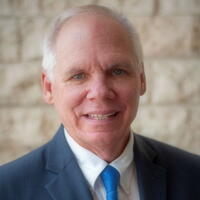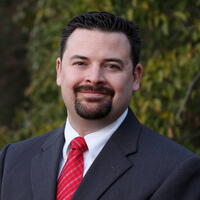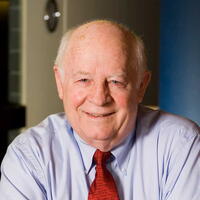ICMA's Local Government Excellence Awards recognizes individual achievement as well as outstanding local government programs.
Award for Career Excellence in Memory of Mark E. Keane

Darin Atteberry, ICMA-CM
City Manager, Fort Collins, Colorado
Darin Atteberry’s career in local government has been defined by excellence, innovation, taking organizations to the next level, and making sustainable improvements to the communities he has served.
Colleagues and elected officials alike value Atteberry’s aspirational leadership and drive for results. They praise his knack for listening, fairness, aptitude for the political subtleties of their jobs, and deep respect for the council-manager form of government.
Under his leadership, Fort Collins was one of the first communities in the country to adopt a priority, zero-based budgeting approach; conducted multiple reorganizations to better align service delivery; and was only the third municipality to receive the prestigious Malcolm Baldrige National Quality Award.
Atteberry worked in transportation planning in the Atlanta, Georgia, area, and Vancouver, Washington, until former Fort Collins City Manager John Fischbach hired him as the city’s assistant city manager.
He began improving service delivery in Fort Collins by unifying complementary functions that had previously been separate, including communication and technology services and planning, development, and transportation services. He also led the creation of sustainability services, comprising environmental health, economic health, and social sustainability, and overseen by a chief sustainability officer.
With guidance and support from the community and council, the city organization has long taken a triple bottom-line approach to policy decisions. Using tools like this assessment, staff consider all elements of sustainability in decision making. The city’s goal is to reduce carbon emissions by 80 percent below 2005 baseline levels by 2030 and to be carbon neutral by 2050.
Atteberry transformed the budget process by overseeing the introduction of a version of budgeting for outcomes (BFO), which uses “buyers and sellers” to produce and select budget offers to build a comprehensive city budget.
This method proved its worth, especially during the 2009 recession, when the city was able to make strategic cuts in noncompetitive areas, rather than across-the-board reductions. It also enabled the city to fund innovative ideas from the grass roots, increase transparency and community engagement in the budget process, and align the budget and its strategic plan.
Atteberry finds leading practices and creative ideas he can use at home wherever he travels. Inspired by charming alleyways reserved for diners and shoppers he encountered on a trip to Italy, he initiated an alley improvement program in downtown Fort Collins that created pedestrian-friendly, aesthetically pleasing spaces.
When focusing on the issue of municipal broadband, he invited the city’s incumbent Internet providers to speak to the council’s Futures Committee (another idea of his) about their vision for the future. At the time, neither of them had plans to provide fiber-to-the-premise ubiquitously across the city.
Lack of vision wasn’t a plan. Atteberry led a survey of options available to the city. After a year of research, Fort Collins took a proposal to the voters that would authorize up to $150 million in bonds to allow the city to build and operate its own broadband utility.
Despite a $900,000 opposition campaign led by the incumbent providers, voters approved the measure. The city plans a 2020 launch of the new system.
A tireless advocate for systematic, repeatable improvement, Atteberry has fostered an organizational culture that supports the city in providing world-class services through operational excellence and innovation.
In 2009, when Fort Collins adopted the Malcolm Baldrige Performance Excellence Framework, Atteberry led the creation of the city’s first enterprise-wise strategic plan, which is now connected to every budget offer.
Other Baldrige innovations include improved recognition and management of the city’s 8,000 volunteers, implementation of a community dashboard to better track results, and creation of a process improvement and program evaluation division.
In 2014, the state recognized Fort Collins with its highest honor, the Rocky Mountain Performance Excellence - Peak Award Level 4. In 2017, the city received the Malcolm Baldrige National Quality Award.
Darin Atteberry believes that local government can be great. By encouraging staff to take their own initiative, relating with people on a personal level, relentlessly pursuing excellence, and challenging others to do the same, he has made local government great.
Established in memory of former ICMA Executive Director Mark E. Keane, this award recognizes an outstanding local government administrator who has enhanced the effectiveness of government officials and consistently initiated creative and successful programs.
Award for Career Development in Memory of L. P. Cookingham
 Gloria Hurtado
Gloria Hurtado

Deputy City Manager, Santa Rosa, California
Gloria Hurtado has spent more than 20 years recognizing, nurturing, and developing new talent in professional local government management.
Hurtado has been Santa Rosa’s deputy city manager since 2015, bringing deep experience in managing people, budgets, and social service programs.
One of her first acts in Santa Rosa was to institute a City Manager’s Fellow Program, which offers city employees with an interest in management an opportunity to work as part of the city’s executive team on high-level projects.
“I was fortunate enough to be selected as the first-ever City Manager’s Fellow,” writes Joey Hejnowicz, an administrative analyst in Santa Rosa’s Office of the City Manager. “During my six months, I gained new experiences, competencies, and relationships that have undoubtedly helped maximize my career potential. Gloria has a passion for helping her managers and staff be better at what they do.”
“The program was a perfect way for me to explore my interest in working in city management while gaining many insights into how government works at the executive level,” adds Erin Morris, AICP, city of Napa, California, Community Development Department planning manager
Before joining the Santa Rosa team, Hurtado served as assistant city manager in San Antonio, Texas. She led the effort to develop the city’s Women’s Leadership and Mentoring Program (WLMP) to cultivate internal talent and prepare women for the next steps in their careers.
The program has had impressive results. Nearly 92 percent of the mentees who begin WLMP complete it, and 83 percent of those who completed the program are still employed with the city. In addition, almost 36 percent of its participants have successfully competed for a promotion either while they were participating in WLMP or after finishing their year.
“The impact of the program is being felt throughout the organization,” attests San Antonio, Texas, City Manager Sheryl Sculley. “Gloria is a champion of succession planning and leadership development.”
Adds San Antonio Human Resources Director Lori Steward, “Gloria not only positively impacts staff development during her tenure, she leaves a legacy of success when she exits an organization.”
Before moving to San Antonio, Hurtado held management positions with the city of Phoenix, Arizona, including 13 years as human services director. She managed multiple federal grants for Head Start, senior services, and homeless programs.
In Phoenix, Hurtado was instrumental in the establishment of an intern program that enabled employees to serve a year in a different area of the department.
Gina Ramos Montes, who was a management intern in Phoenix and is now Avondale, Arizona, assistant city manager, believes that Hurtado was instrumental in the development of her career.
“Gloria took an active interest in developing my skills as a professional,” writes Montes. “She gave honest, constructive feedback and pushed me to embrace new challenges. She was generous in giving me credit and exposure to upper management. She even assisted me in preparing to interview for advancement opportunities outside her department. I know she took special pride in seeing her employees advance.”
“I cannot begin to tell you the impact Gloria’s strong leadership has had on my success,” adds Phoenix Deputy City Manager Deanna Jonovich. “Because of her encouragement and guidance, while working for her I obtained my master’s degree in leadership from Northern Arizona University. I attribute my career advancement in the organization to her strong mentoring.”
Jeffrey Jamison, deputy director of the Phoenix Human Services Department, first met Hurtado when she held the same position. He participated in a six-month internship in her office.
“She tailored each internship toward the strengths of each intern,” Jamison wrote. “Personally, my experience in this program changed my career path. Even after the program, Gloria continued to assure that I gained experiences and insights into all aspects of leadership, from defining my leadership philosophy to introducing me to the technical processes and strategic thinking required for outstanding governance in public service.”
The professional success of interns and staff who have been mentored by Gloria Hurtado is a testament to her generosity and talent in finding and developing the next generation of public servants.
This award goes to an outstanding local government administrator who has made a significant contribution to the career development of new talent in professional local government management, in honor of former ICMA President L. P. (Perry) Cookingham, who is credited with creating the local government internship.
Assistant Excellence in Leadership Award in Memory of Buford M. Watson, Jr.
 Henry Hill III, ICMA-CM
Henry Hill III, ICMA-CM

Deputy City Manager, Frisco, Texas
Henry Hill is known for exemplifying the ideals and values of professional management. In his more than 38 years of service to local governments, Hill has led by example, providing the highest level of customer service to internal and external customers alike.
Hill has always taken on new challenges, regardless of the title that comes with the job. He came to Frisco in 2003, after serving nine years as the manager of Melbourne, Florida. At the time, Frisco had a population of 55,000; however, he saw its potential for growth. Today, Frisco’s population is almost 180,000, and the number of city employees has grown from some 300 in 2003 to more than 1,500 in 2018.
Hill manages Frisco’s external services, including police, fire, parks and recreation, library services, convention and visitors’ bureau, communication and marketing, and public works.
He spearheaded efforts to increase organizational efficiency, planning, and productivity. He led negotiation of Frisco’s waste management contracts, saving city residents several million dollars. He is also one of the principals in water conservation management efforts, helping achieve significant reductions in daily per capita use.
Culture is key to the effectiveness of a rapidly growing organization. Hill has made it a priority to focus on quality customer service, public advocacy for the city, effective communications, and staff and operational improvement. He has also made it his charge to ensure that Frisco’s organization and employees are committed to the best in resident service and the highest ideals of integrity as public servants.
Front-line employees praise Hill’s management style for his consistency, fairness, dependability, and support for them in doing their jobs. He makes it a practice to write a personal note to each employee on his or her yearly work anniversary.
Hill has led or developed programs to strengthen employee engagement. He speaks at every new employee orientation session on behalf of the city manager’s office, explaining the council-manager form of government, the importance of being a trusted public servant, and what makes working in Frisco special.
He also championed the creation of the city’s five core values: its employees, outstanding customer service, fiscal responsibility, operational excellence, integrity. To make them a common language for all employees, he led the development of core value training and the establishment of a core value recognition committee to celebrate employees whose work exemplifies these values.
Hill has overseen a new initiative to strengthen the city’s culture of continuous improvement with the development of Frisco’s own Lean Academy. Frisco Lean teaches city staff how to incorporate lean practices into their work activities. More than 150 employees have been trained in the practices since the program’s beginning in late 2017, and more classes are planned.
He has instituted several programs to recognize staff, including a monthly awards luncheon that marks five-year incremental anniversaries and recognizes employees who have best demonstrated city values each month.
“I am proud to have Henry as a key part of my management team,” writes Frisco City Manager George Purefoy. “I cannot say enough about Henry’s contribution to the development of Frisco’s organization, its culture, and customer service ethic.”
Hill has been an ICMA member since 1981, serving on the conference evaluation and governmental affairs and policy committees, and as a mentor with the Emerging Leaders Program. He became an ICMA credentialed manager in 2002, the program’s first year.
He is a member of the Texas City Management Association and serves on its ethics committee. He is also on the Leadership Frisco Advisory Board and the Frisco Chamber of Commerce Board of Directors (ex-officio).
This award, commemorating former ICMA President Buford M. Watson Jr., honors a local government management professional who has made significant contributions toward excellence in leadership as an assistant (regardless of title) to a chief local government administrator or department head.
Early Career Leadership Award in Memory of William H. Hansell, Jr.
 Brant Hanson, ICMA-CM
Brant Hanson, ICMA-CM

City Manager, Ephraim City, Utah
Ephraim City Mayor Richard Squire remembers the first time he met Brant Hanson. It was April 2014 and Squire was a member of the committee that was interviewing candidates for the city manager’s job. The committee had narrowed its field to six people.
“As soon as Brant came into the interview, he assumed a commanding presence because of the investigation he had conducted about the city and his comprehension of its issues and history,” writes Squire. “He impressed me so much with the knowledge and background he had already gained about the city. Brant became our top choice.”
Squire’s respect for Hanson has only grown during the past four years. He cites Hanson’s integrity, forthrightness, and comprehension of complex matters when he writes, “Brant has earned my absolute trust and loyalty.”
Hanson has invested the time and concern necessary to gain the trust and buy-in of the city’s employees. With patience, wisdom, and a steady touch, he has pulled together a dynamic leadership team that is in tune with city employees at all levels.
Hanson has proven that he has a “cool head” during crisis. He gains consensus among administrative staff as well as elected officials with his honesty and full understanding of the facts of the crisis or problem at hand.
In June 2017, the city’s police department faced a crisis just six months after introducing a new template for the force, which was developed for police reports to ensure each report addresses critical information that is necessary if prosecution is pursued. Several officers refused to use it; eventually three officers resigned.
The three officers who resigned were patrol officers, which left the police department with only a police chief and a police sergeant. When this chief retired, Hanson worked closely with the interim chief to establish policies and procedures that previously had been lacking. Today, the force is strong with four new officers and a new police chief. The culture and morale of the department is higher now than ever.
Located in the second driest state in the nation, access to water means the difference between growth and stagnation for Ephraim City. It recently acquired almost 504 acre-feet of water that will provide water for 1,120 new homes.
After researching financing options and possible uses for the land, Hanson led negotiations for a water rights agreement that is rare for its size in the Western United States. The rights will be vital for Ephraim City’s growth through the next three or four decades as its housing stock expands and Snow College, a premier two-year college, increases enrollment.
Ephraim City’s culinary (drinking) water is piped through a tunnel that runs a mile through the mountains. The Bureau of Reclamation owns the tunnel; Ephraim and the Ephraim Irrigation Company maintain it. Built in 1937, the tunnel was only minimally maintained since the late 1990s and, by 2014, it was in danger of total collapse.
In need of $4.5 million to rehabilitate the tunnel, the city faced the bureaucratic nightmare of applying for grants. Again, Hanson took charge, organizing a trip to Washington, D.C., for Ephraim City’s leadership to solicit the help of Utah’s congressional delegation.
He then guided the city’s professional team in securing $635,000 on a 50/50 grant from the community impact board with highly favorable terms. He helped secure a $1 million WaterSmart grant and negotiated a complex package of other financial benefits for the rehabilitation project.
Hanson has also helped Ephraim City take advantage of grants for several other major projects, including a $4.2 million rehabilitation of its airport runway and accompanying apron. He managed an $850,000 main street beautification project, which has greatly enhanced the downtown area. As a result, four businesses invested more than $4 million in remodels and reconstructions.
Brant Hanson’s unique set of skills in leadership, finance, legislation, law, grant writing and fundraising--combined with a down-to-earth, practical approach to problem solving--make him the perfect manager for Ephraim City. “We hope,” notes Mayor Squire, “to keep him around for many, many years.”
Underwritten by ICMA-RC. This award is accompanied by a $5,000 stipend to promote professional development of local government managers.
Established in memory of former ICMA Executive Director William H. Hansell Jr., this award recognizes an outstanding early career local government professional who has demonstrated leadership, competency, and commitment to local government as a profession.
Academic Award in Memory of Stephen B. Sweeney
 Orville Powell
Orville Powell

Clinical Associate Professor Emeritus, Indiana University, Bloomington
Orville Powell’s career in local government spans more than 50 years and has taken him from hands-on management to inspiring students to choose a career in public service. He combines the experience of a seasoned professional public administrator with a passion for bringing talented young people into the management profession.
Powell began his career in local government in 1963 as a budget analyst for the city of Winston-Salem, North Carolina, and then became city manager there only seven years later. In 1979, he became finance director of Petersburg, Virginia, and, in 1980, city manager of Gainesville, Florida.
Powell’s commitment to the development and evolution of the profession of public management has been a hallmark of his career. In 1980, he took what then was a bold step by hiring Gainesville’s first African American police chief.
At a time when race relations were still a sensitive issue, Powell’s decision transcended the racial prejudice that had historically divided Southern communities by hiring based on skills and abilities. As result, the Alachua County Branch of the NAACP recognized him as its Man of the Year in 1982. Gainesville designated “Orville Powell Day” in 1983.
Powell’s final position before he retired from city management was as manager of Durham, North Carolina, 1983 to 1997. Powell also served as a consultant to local governments in Russia, Bulgaria, India, and Swaziland.
In 1998, Powell moved into a new phase of his career when he accepted the position of clinical associate professor of public management at Indiana University at Bloomington. There he developed its local government management program, both undergraduate and graduate, within the School of Public and Environmental Affairs.
As director of the program, Powell shared his knowledge and passion for public administration with thousands of students, inspiring a new generation of professionally trained public servants who today practice at every level of government management.
“I was recently selected as one of 45 finalists for the 2018 ICMA LGMF program,” writes Michael Large, clinical associate professor, Indiana University at Bloomington. “There is no doubt in my mind; had it not been for the continued support of Professor Orville Powell, I would not have the opportunity to be a part of this prestigious program or profession. What is even more amazing to me is that I am only one of thousands who will tell you the same thing about this great man, mentor, and professional public administrator.”
The university recognized Powell with multiple awards, including the Indiana University School of Public and Environmental Affairs Undergraduate Teaching Award (2003, 2006, and 2009); Graduate Teaching Award (2004); Board of Trustees Teaching Award (2008); and Student Choice Award (2006). When he retired from his teaching position in 2015, the university bestowed upon him the Orville Powell Inspiration Award, a new award in his name.
Beyond his service to students, Powell served as a volunteer member of the ICMA Liaisons (2004–2016) and the Committee on International Activities (1994–1997). He served on the board of the Kentucky City/County Management Association (2005–2015). He participated in the exchange program to New Zealand in 1992.
This is the second time ICMA has recognized Powell with the Sweeney Award (the first was in 2003), as well as a Distinguished Service Award in 2014.
He has authored several books: City Management: Keys to Success ; Earth is a Nice Little Planet: Who Will Save It? (with Christina Park); and Trouble Came Calling .
Orville Powell has dedicated his life to the highest standards of professional local government management, as well as to cultivating the young leaders who came after him. His infectious enthusiasm and passion for the profession have motivated thousands of his employees, peers, and students to make positive change in their communities and a higher quality of life for all.
Established in the name of the longtime director of the University of Pennsylvania’s Fels Institute of Government, this award is presented to an academic leader or academic institution that has made a significant contribution to the formal education of students pursuing careers in local government.
